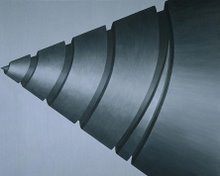Being political without producing politics
by Markus Miessen
The moment I stepped out of the baggage lobby and entered the shopping mall at
One level below, I got on the convenient intercity to Utrecht where the charming director of Casco-the institution that hosted this year's Camp for Oppositional Architecture to which I had been invited to present a paper-picked me up. The Camp, organised by the Berlin-based group AnArchitektur, is a bi-annual conference at which possibilities of resistance within the field of architecture and planning are debated. Under the conceptual heading of "Theorizing Architectural Resistance", the conference set out to focus on analytical approaches that invent, explore and reflect on means to "withstand the demands of a capitalist production of space". The hosts had chosen both a relevant and appropriate site: as part of the Vredenburg Music Centre by Herman Hertzberger, Expodium-an exhibition space and platform for contemporary art-was accessible from the surrounding train station's shopping arcade. Up to that point, the environments through that I had manoeuvred hadn't changed since I had left the taxi outside
The enticingly warm welcome and casual atmosphere made everyone feel at home right from the start. After a short introduction by Casco and AnArchitektur, the invited contributors, who were ranging from
Once I had made my way to the hotel, I was puzzled. Thanks to presentations that concentrated on potentialities of discourse and practice, the event had its moments of clarity. However, I couldn't help but feeling the inevitable: that it lacked focus. Rather than discussing blueprints for change that might leave behind what we criticise as outmoded concepts, we were regurgitating leftist claims. There was a general negativity that, maybe because I had only arrived from
Money and economic realities were never mentioned. The fact that all contributors were essentially Middle Class theorists or practitioners was being left behind at the gates. And so was Ôthe enemy'. It wasn't too hard to tell that some of the participants had just arrived from
Two idioms, which were already manifest in the event's title, did not help: 'camp' and 'oppositional'. While the former defends a delineated territory, which essentially caters for an insular conversation, the latter clearly distinguishes itself from something that has to be named (the coalition) while rarely offering operational modes of action, but rhetoric. It seemed to me that especially today, where capitalism will appropriate your disaffirming move before you have even made it, the idea of the 'oppositional' needs to be rethought. At the same time, it needs to be pointed out that the goals of the Camp ("Theorizing Architectural Resistance") have been met. Theorizing worked. But then what? Architecture? 
For a start, it would have been helpful to invite polar opposites to join the discussion. Why not invite a shopping mall developer, a bureaucratic council planner, and a speculative mass-housing broker? It could deliver an insight into the other end of the spectrum as well as stimulate a discussion about what one seemingly opposes to. In such setting, conflicting practice would act as a mode of creating an arena of alternative dialogue. It is precisely at this moment (when those who usually do not get gained access to participate can enter the zone of conflict) that politics, not through representational models, but through practice, is being produced. This moment-the 'becoming visible', the moment of rupture-presents the point at which one starts to produce political space. But since we were all nodding at what each other were saying (there was the occasional disagreement!), it was all taking place within an arena of like-minded discourse. How does one turn an identified problem into a discursive strategy that becomes operational rather than self-referential within the limits superimposed by its own system? If we loathe the production processes of the capitalist market system, then what are the forms of valorisation that we welcome or propose? It is precisely how conflict is being produced that future camps need to address. Now, in order for this debate to take place, it is crucial to devise methods to get 'the enemy' to join such events.
With this second camp, AnArchitektur have successfully continued their commendable exploration into alternatives and have organised an event that brought up an array of interesting issues, speakers, and discussions. It remains to be proven whether future conferences will manage to turn these discursive events into operational recipes. Although this review could be interpreted as an 'opposition to opposition', what I would rather like to propose is a project-based model for a future symposium: one in which concrete situations are being discussed, projects are being analyzed, and alternatives are being brought forward.
Wednesday, May 9, 2007
Being political without producing politics
Subscribe to:
Post Comments (Atom)






No comments:
Post a Comment